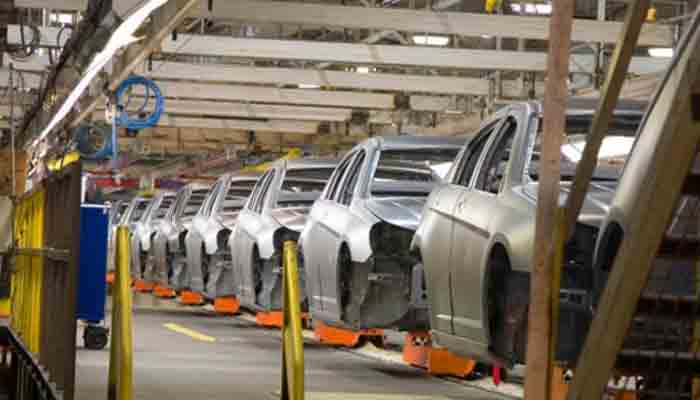Indus Motors rules out layoff despite slowdown
KARACHI: Indus Motor Company (IMC) has resumed half of its production capacity from the beginning of this month after pulling the plug on auto making for 15 days in September, the company’s spokesperson said on Tuesday.
The spokesperson emphasised there would be no layoff of employees despite slowdown in production. “Yet, we have decided not to go for layoffs despite the hard times. We are absorbing the financial crunch,” he said in a statement. “IMC has resumed production to 50 percent capacity from October 1 after a closure over the last 15 days of September.”
The official said the country is going through an economic slowdown and the overall market has remained volatile. The factors largely contributing to this situation include rupee depreciation, reduction in car financing, increase in federal excise duties and higher input costs. “There has indeed been a great struggle,” the official added.
Car sales plummeted 39.4 percent to 31,107 in the first quarter of the current fiscal year. Likewise, there was a decline in sales of 49.7 percent in trucks, 26 percent in buses, 31.6 percent in tractors, 58 percent in jeeps, 48 percent in pickups and 19.5 percent in two/three wheelers in the July-September period.
Rupee has devalued 31.6 percent over the year. Additionally, the government slapped seven percent advance customs duty, three percent additional sales tax on all imports and 7.5 percent federal excise duty on vehicles of 2000cc and above engine power. The government further imposed 2.5 percent and five percent federal excise duty on locally-manufactured vehicles. Of the total cost of a vehicle, 40 percent comprises taxes and levies.
“All these have adverse impact on auto sector and resulted in a major decline in sales,” the official said. “It is a misconception that the rising rate of tax collection will not affect vehicle sales and total tax collection. In fact, decline in sales will result in decline in tax collection from the auto sector.”
The company’s spokesperson said a general perception exists in Pakistan that cars assembled locally have gradually become expensive without any value addition. The prices of cars have not increased but have been adjusted according to the depreciation of the rupee against the dollar. “Prices have, in fact, been reduced by the manufacturers but it seems as if they have increased since the PKR (rupee) is depreciating in relation to the US dollar and the customer is paying more in rupee terms.”
The spokesperson said IMC has successfully incorporated more localisation, increased specifications and reduced the dollarised cost by procuring local parts worth over Rs200 million every working day with every model change.
In 1993, price of corolla, the company’s flagship brand, was $19,630 with 15 percent general sales and the rupee value was Rs27 against the dollar. Now, in 2019, the same corolla is available for $15,618 despite 17 percent sales tax and five percent federal excise duty, while the rupee value against the dollar is Rs160. This means better specifications at low price.”
“This clearly showed that over the years, IMC had localised more and sustained the burden of heavy taxation and PKR devaluation to keep providing quality vehicles at low prices to its valued customers.”
-
 Winter Olympics 2026: Lindsey Vonn’s Olympic Comeback Ends In Devastating Downhill Crash
Winter Olympics 2026: Lindsey Vonn’s Olympic Comeback Ends In Devastating Downhill Crash -
 Adrien Brody Opens Up About His Football Fandom Amid '2026 Super Bowl'
Adrien Brody Opens Up About His Football Fandom Amid '2026 Super Bowl' -
 Barbra Streisand's Obsession With Cloning Revealed
Barbra Streisand's Obsession With Cloning Revealed -
 What Did Olivia Colman Tell Her Husband About Her Gender?
What Did Olivia Colman Tell Her Husband About Her Gender? -
 'We Were Deceived': Noam Chomsky's Wife Regrets Epstein Association
'We Were Deceived': Noam Chomsky's Wife Regrets Epstein Association -
 Patriots' WAGs Slam Cardi B Amid Plans For Super Bowl Party: She Is 'attention-seeker'
Patriots' WAGs Slam Cardi B Amid Plans For Super Bowl Party: She Is 'attention-seeker' -
 Martha Stewart On Surviving Rigorous Times Amid Upcoming Memoir Release
Martha Stewart On Surviving Rigorous Times Amid Upcoming Memoir Release -
 Prince Harry Seen As Crucial To Monarchy’s Future Amid Andrew, Fergie Scandal
Prince Harry Seen As Crucial To Monarchy’s Future Amid Andrew, Fergie Scandal -
 Chris Robinson Spills The Beans On His, Kate Hudson's Son's Career Ambitions
Chris Robinson Spills The Beans On His, Kate Hudson's Son's Career Ambitions -
 18-month Old On Life-saving Medication Returned To ICE Detention
18-month Old On Life-saving Medication Returned To ICE Detention -
 Major Hollywood Stars Descend On 2026 Super Bowl's Exclusive Party
Major Hollywood Stars Descend On 2026 Super Bowl's Exclusive Party -
 Cardi B Says THIS About Bad Bunny's Grammy Statement
Cardi B Says THIS About Bad Bunny's Grammy Statement -
 Sarah Ferguson's Silence A 'weakness Or Strategy'
Sarah Ferguson's Silence A 'weakness Or Strategy' -
 Garrett Morris Raves About His '2 Broke Girls' Co-star Jennifer Coolidge
Garrett Morris Raves About His '2 Broke Girls' Co-star Jennifer Coolidge -
 Winter Olympics 2026: When & Where To Watch The Iconic Ice Dance ?
Winter Olympics 2026: When & Where To Watch The Iconic Ice Dance ? -
 Melissa Joan Hart Reflects On Social Challenges As A Child Actor
Melissa Joan Hart Reflects On Social Challenges As A Child Actor




